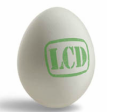Therapeutic Ketogenic Diets: Evidence from the Experts
 Keto lunch: Egg-and-cheese stuffed avocado
Keto lunch: Egg-and-cheese stuffed avocado
Although I understand the science, have read much of the work of the people listed above, and have worked with several clients who choose to follow a very-low-carbohydrate ketogenic diet, at this point I wouldn’t consider myself an expert in this area. In fact, I’ve spent the last year or so clarifying that my own approach to diabetes and weight management is low carb but not necessarily ketogenic. I make this distinction because I believe a very-high-fat ketogenic diet isn’t necessary and in some cases can be counterproductive for weight loss and blood glucose control if energy/calorie intake from fat is too high. I find that a diet moderately high in protein and fat with limited carbohydrates (25-70 grams digestible or “net” carbs per day, depending on the person) works best for most. It’s also the type of diet I’ve followed for several years, with great results.
“The More Fat You Eat, The More Fat You’ll Lose”?
Now, a ketogenic diet containing less than 20 grams of net carb daily can produce weight loss provided energy intake is reduced, which often occurs spontaneously with carb restriction. There’s no denying that many people experience dramatic weight loss with minimal carb intake, are able to maintain the loss, and feel great eating this way. But some of the statements I’ve read about keto being a miracle for dropping unwanted pounds are simply untrue, such as:
- You can eat as much fat as you want as long as you keep your carbs really low, because fat doesn’t stimulate insulin secretion (I’ve seen the phrase, “The more fat you eat, the more weight you’ll lose.”)
- If you’re eating very low carb and not losing, you need to reduce your protein and increase your fat intake to at least 75% of your calories.
- You should aim for the highest serum ketone levels possible to ensure maximal fat burning; i.e., you’ll lose more weight if your serum beta-hydroxybutyrate level is 3 or 4 mm than if it’s 0.5 or 1 mm.
Very-low-carb ketogenic diets don’t work that way. As just one example, a physician friend of mine has diabetes, is of normal weight, and has been following a very-low-carb ketogenic diet for several years. He recently experimented with increasing the amount of coconut oil in his already high-fat diet. Although his ketone levels increased to well above 3 mm, he put on several pounds over the course of a few months, which he lost by cutting back on the coconut oil. Adding too much butter, cream, olive oil, or any other fat can have the same effect, as can eating excessive quantities of protein or carbohydrates.
Also, think about the group following a very strict traditional ketogenic diet: children with epilepsy that have failed medication therapy. This diet is about 90% fat, 2-4% carb, and less than 10% protein, which results in a level of ketonemia that in many cases significantly reduces or even eliminates seizures (The Modified Atkins Diet is very low in carbs but does not restrict protein, is much easier to adhere to long term, and has also shown effectiveness for seizure management). Children don’t lose weight on the ketogenic diet when calorie intake is adequate, and for that and other reasons, it’s very important that specially trained dietitians (true ketogenic diet experts) work closely with patients and their families to ensure energy and nutrient needs are met, which involves weighing food to the gram on a kitchen scale. In fact, in the book “Ketogenic Diets: Treatments for Epilepsy and Other Disorders” by Dr. Eric Kossoff and other specialists, there’s a section devoted to potential weight gain — or weight loss — that may occur during ketogenic diet therapy.
Therapeutic Applications for Ketogenic Diets
While the results of studies investigating the effects of ketogenic diets (KDs) on performance are impressive (1), what I’m most enthusiastic about is their use as an adjunct to traditional therapy in treating serious, often life-threatening diseases where only mediocre results have been achieved with medication or other non-nutritional therapy alone. There’s so much established and emerging evidence on their benefits (2), and it’s growing monthly as researchers continue publishing their findings.
One of the best-known applications for KDs is cancer, particularly certain types of brain cancer like glioblastoma (3,4). Cancer is a very complex disease, and there are conflicting opinions as to its primary cause(s). Dr. Thomas Seyfried and others in the field of cancer research believe that it results when cells develop dysfunctional mitochondria that are unable to generate energy the way normal cells do (oxidative phosphorylation) and must instead use a different pathway reliant on large amounts of glucose (anaerobic glycolysis) in order to meet energy demands. (For anyone interested in reading more about the science behind this — along with potential risk factors and ways to address them — please check out the excellent cancer series by nutritionist Amy Berger on her blog, Tuit Nutrition.)
Based on several studies, Drs. Seyfried, D’Agostino, Champ, and others believe that increasing serum levels of the ketone beta-hydroxybutyrate via a diet very high in fat and moderate in protein with minimal carbohydrates results in an unfavorable environment for cancer cells. According to these researchers, calories must often be somewhat restricted as well in order to achieve a therapeutic level of ketonemia while simultaneously keeping blood glucose levels low enough to reduce cancer cell growth and inflammation.
For a personal account of what it’s like living with brain cancer and using a KD in combination with traditional therapy, I highly encourage you to read the blogs of two insightful and inspirational people I follow online: Alix Hayden in Canada and Andrew Scarborough in the UK. These two are truly experts on what day-to-day management of cancer (and in Andrew’s case, epilepsy as well) entails.
There’s a growing body of research suggesting that people with with Alzheimer’s disease, traumatic brain injury (TBI), ALS (Lou Gehrig’s disease), Parkinson’s, and other neurological diseases may also benefit from ketogenic diets (5-9). While much of the evidence comes from studies on mice and other animals, the results of human research are also promising (10-12), including the case of a 64-year-old woman who experienced significant regression of an advanced glioblastoma tumor (nearly unheard of in a woman her age) when a calorie-restricted, ketogenic diet was combined with standard therapy (13). Unfortunately, as Dr. Seyfried discusses in his excellent presentation Cancer: A Metabolic Disease with Metabolic Solutions, the tumor came back once she went off the diet and began taking the drug Avastin.
Below is another lecture from radiation oncologist Colin Champ discussing the role ketogenic diets, calorie restriction, and fasting can play in cancer treatment. The presentation isn’t overly technical, and Dr. Champ covers a lot here in his typical engaging style.
And if you’re interested in learning about the latest research on the wide-reaching effects of ketogenic diets for neurological disorders and certain cancers, check out Dr. Dominic D’Agostino’s talk Metabolic Therapies: Therapeutic Implications and Practical Application. Notice that the KD is used in combination with medication or hyperbaric oxygen therapy in order to provide maximum benefit.
I realize that there is still much that is unknown in the field of ketogenic diets, and I don’t want to make premature statements about the extent of their ability to prevent or treat disease . For instance, the KD may not be appropriate or effective for all types of cancer, including some brain cancers (14). Anecdotally, some people have experienced great benefit from being in sustained ketosis while others haven’t. But what I’ve read and heard about their potential uses is certainly encouraging.
Looking Ahead
After I finished my dietetic internship and became a dietitian, I worked at a large Veterans Health Administration hospital for five and a half years. The first two were spent in the Spinal Cord Injury unit and the remainder in outpatient care. During that time I saw hundreds of patients with cancer, TBI,’s ALS, Alzheimer’s, Parkinson’s, and other debilitating conditions. The main goals for nutrition therapy were to prevent weight/lean mass loss and ensure nutritional adequacy by making appropriate dietary recommendations — if they were even capable of eating (some required tube feeding). It was heartbreaking to see the devastating effects of disease and treatment on patients and their families, knowing there was little I could do beyond trying to prevent loss of muscle mass and micronutrient deficiencies by prescribing high-protein foods and supplements.
The possibility that ketogenic diets may one day become part of standard therapy for various types of serious illness — reducing the current reliance on toxic therapies, improving outcomes, and elevating people’s quality of life — makes me eager to continue learning as much as possible about them so I can provide “expert” nutritional guidance that may truly make a difference.
References
1. Phinney SD. Ketogenic diets and physical performance. Nutr Metab (Lond). 2004;1:2
2.Paoli A, et al. Beyond weight loss: a review of the therapeutic uses of very-low-carbohydrate ketogenic diets. Eur J Clin Nutr 2013 Aug;67(8):789-96
3. Seyfried TN, et al. Metabolic therapy: a new paradigm for managing malignant brain cancer. Cancer Lett. 2015 Jan 28;356(2 Pt A):289-300
4. Varshneya K, et al. The Efficacy of Ketogenic Diet and Associated Hypoglycemia as an Adjuvant Therapy for High-Grade Gliomas: A Review of the Literature. Muacevic A, Adler JR, eds. Cureus. 2015;7(2):e251
5. Paoli A, et al. Ketogenic Diet in Neuromuscular and Neurodegenerative Diseases. BioMed Rese Int. 2014;2014:474296
6. Greco T, et al. Ketogenic diet decreases oxidative stress and improves mitochondrial respiratory complex activity. J Cereb Blood Flow Metab. October 2015 (epub ahead of print) DOI: 10.1177/0271678X15610584
7. Seyfried, TN. Ketone strong: emerging evidence for a therapeutic role of ketone bodies in neurological and neurodegenerative diseases. J Lipid Res. 2014 Sep;55(9):1815-7
8. Stafstrom CE, Rho JM. The Ketogenic Diet as a Treatment Paradigm for Diverse Neurological Disorders. Front Pharmacol. 2012;3:59
9. Hartman AL. Neuroprotection in Metabolism-Based Therapy. Epilepsy Res. 2012;100(3):286-294
10. Gasior M, Rogawski MA, Hartman AL. Neuroprotective and disease-modifying effects of the ketogenic diet. Behav pharmacol. 2006;17(5-6):431-439
11. Allen BG, et al. Ketogenic diets as an adjuvant cancer therapy: History and potential mechanism. Redox Biology. 2014;2:963-970
12. Champ CE, et al. Targeting metabolism with a ketogenic diet during the treatment of glioblastoma multiforme. J Neuroncol. 2014 Mar;117(1):125-3
13. Zuccoli G, et al. Metabolic management of glioblastoma multiforme using standard therapy together with a restricted ketogenic diet: Case Report. Nutr Metab (Lond). 2010;7:33
14. Dang MT, et al. The Ketogenic Diet Does Not Affect Growth of Hedgehog Pathway Medulloblastoma in Mice. Xie J, ed. PLoS ONE. 2015;10(7) e0133633

Thanks for tackling another complex topic with your always even-handed, honest approach, distilling facts from hype. Extreme fat intake recommendations for weight loss are being promoted by Jimmy Moore. I’m stunned & saddened by the extent of his influence. I rely on your blog for the most thorough research. Enjoy the videos you post & links for further info.
Thanks so much for your comments and support, Gerri!
I’m actually writing a research paper on this right now. My Professor wanted us to comb the academic journals to find “uncommon” nutritional therapies for chronic conditions. Then she wants us to critique the pros and cons of those therapies based on what we’ve learned from our classes to date. On reading my outline she said,
“This is going to be an exciting paper.”
Fantastic news! Very encouraging that your professor is looking forward reading your paper. Thanks for sharing, and best of luck with everything!